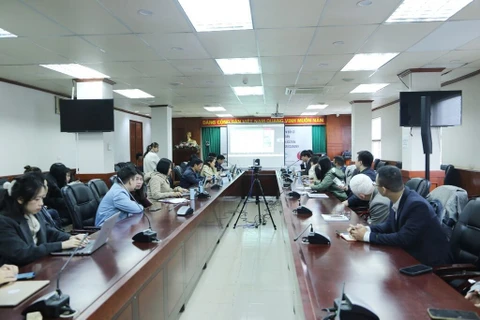
Hanoi (VNA) - Vietnam was the fastest growing digital economy in ASEAN in 2022 and 2023 and it is expected to maintain this position until 2025, with the number of smartphones users anticipated to reach 67.3 million by 2026, accounting for 96.9% Internet users.
The information was highlighted in an article, themed "Thriving spring for ASEAN's digital economy", written by Amanda Murphy, head of Commercial Banking for South and Southeast Asia at HSBC, and Ahmed Yeganeh, head of Wholesale Banking at HSBC Vietnam.
HSBC experts stressed that Vietnam has become a leading market for the digital industry for both local and international players, as the growth of its digital economy continues to impress. Last year, it contributed up to 16.5% to the country's GDP, with over 1,500 Vietnamese digital technology enterprises gaining revenues from foreign markets, an increase of more than 7% compared to 2022.
In a recent survey, 60% of businesses operating in Vietnam responded that they plan to invest in technology and digitalisation of their existing business, with the focus on digital payments, e-commerce, and AI. Those companies believe that adopting and enhancing digital services will help them meet customers' expectations for digital convenience and improve efficiencies.
In this context, capital has become the lifeblood of innovative companies. Against that backdrop, HSBC has enhanced its offering to digital-economy companies, launching a dedicated 1-billion-USD ASEAN Growth Fund that can help finance platform companies with a proven track record in generating sustainable cash flows, even if they do not meet traditional financing criteria.

Amanda said “profitability may not always reflect a company’s potential in its early stages, hence we take a long-term view of potential growth by evaluating companies based on key operating metrics, growth plans and customer-acquisition strategies”.
According to the article, Southeast Asia remains home to the world's fastest-growing digital economy, as the region's digital economy expanded by 12% last year and is expected to record a compound annual growth rate of 16% until 2030, reaching to almost 1 trillion USD value by that year.
This potential is partly driven by ASEAN's growing population of 700 million, gathering a large portion of young, educated and tech-savvy people as well as growing middle-class consumers.
In a recent HSBC survey of businesses operating in ASEAN, 74% of whom intend to increase their investment in the region in 2024.
The acceleration of digitalisation in the region has been boosted by Government programmes, from Singapore to Indonesia, Vietnam, Thailand, the Philippines and Malaysia.
A new 1.3 billion USD government fund was unveiled during an ASEAN-Australia summit in Melbourne early March, providing loans, guarantees, equity and insurance for projects that will boost the ASEAN-Australia corridor.

These factors all create fantastic opportunities for digital economy companies. There are particularly bright prospects for e-commerce, digital financial services, health technology, green technology, the clean mobility ecosystem and artificial intelligence.
As ASEAN’s digital economy expands, cross-border e-commerce is also creating growth opportunities for new- and traditional-economy firms. Making it easier for customers to pay through a company’s digital platforms can be an important revenue driver over the years ahead.
While the past two years have been challenging for many digital economy firms looking to raise capital, there are reasons to be more optimistic in 2024. Progressive approaches to financing, and the region’s strong fundamentals will all help drive the growth ambitions of businesses in ASEAN. And Vietnam, as one of the bloc’s members, will definitely benefit, according to experts./.






















